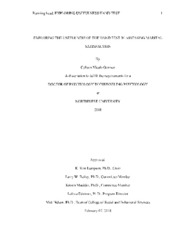Exploring the Usefulness of the Hand Test in Assessing Marital Satisfaction
Abstract
Marital counseling is one of the most sought after forms of psychotherapy. Professionals in this field express a need for a brief marital satisfaction questionnaire as part of their assessment battery. This study explores the usefulness of a projective technique, known as the Hand Test, in assessing marital satisfaction. The Hand Test demonstrates sound psychometric properties in categorizing human behavior as socially adaptive or maladaptive, but has never been used to assess marital satisfaction. The author hypothesized that the more adaptive, constructive responses a participant provided on the Hand Test, the higher that person would score on a marital satisfaction questionnaire. The researcher also explored the inverse, whether or not as maladaptive responses increased, respective marital satisfaction scores decreased. A total of 12 legally married couples residing in the Pacific Northwest participated in the study. Participants completed the Hand Test, Prepare Enrich Marital Satisfaction Questionnaire (EMS), as well as a brief demographic questionnaire created by the author. The author used a simple linear regression to determine whether the Hand Test could predict marital satisfaction when paired with the EMS. The author failed to find the hypotheses supported F(1,18) = .053, p > .05. R2 = .003; possible explanations for these results include a small sample size leading to low power. Despite a lack of statistical significance, the author explored alternatives and advantages to using the Hand Test with married couples, as well as other exploratory statistics. Future directions include replicating the present study with a larger, more diverse sample to determine whether or not low power impacted the present study.
Original item type
PDF
Original extent
56 pages
Collections
Copyright
This original work is protected by copyright. Copyright is retained by the author(s). Works may be viewed, downloaded, or printed, but not reproduced or distributed without author(s) permission.


 Maintained by the Northwest University Library
Maintained by the Northwest University Library